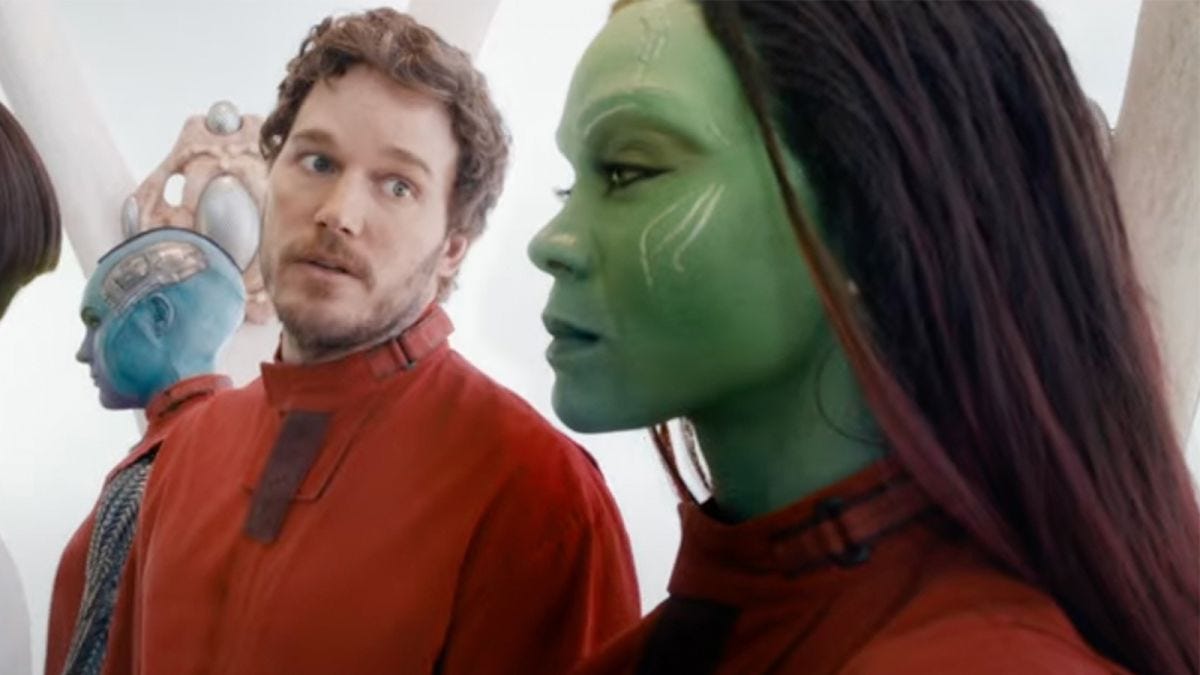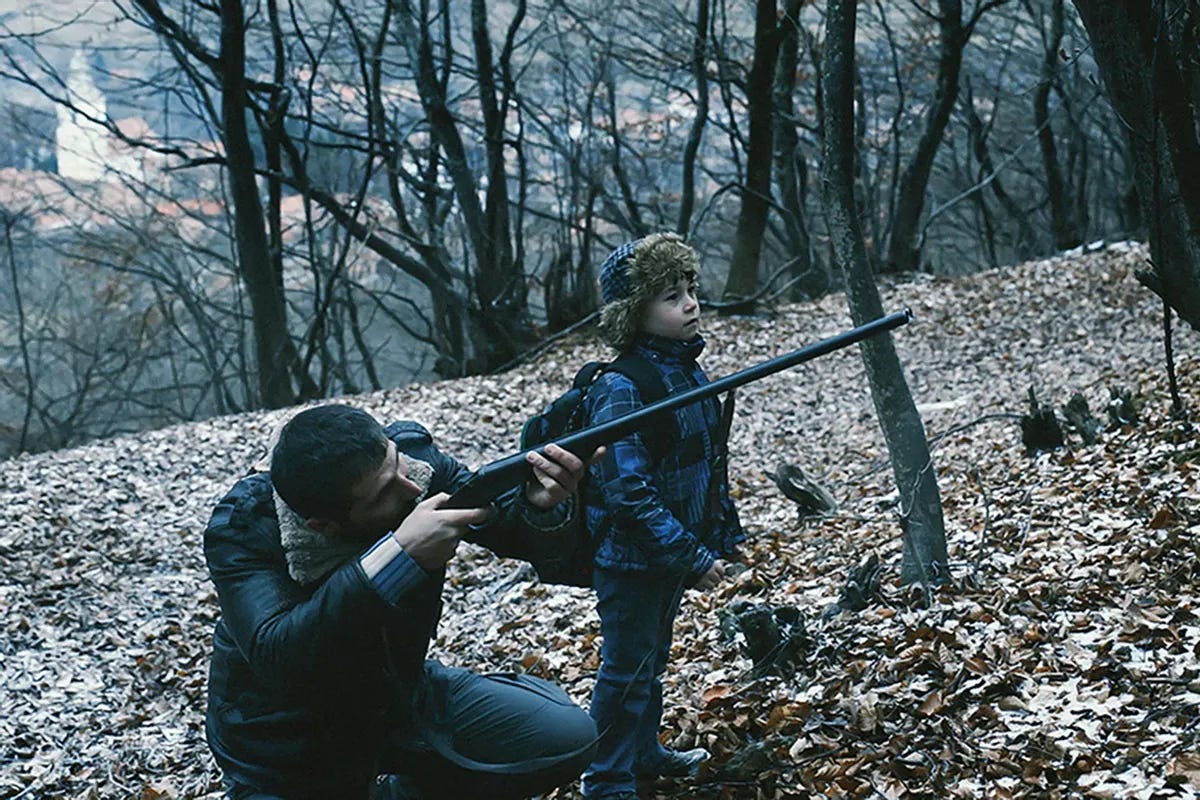In Review: 'Guardians of the Galaxy Vol. 3,' 'R.M.N.'
In theaters this week: a film about a team of cosmic adventurers and a sadly universal story of xenophobia.
Guardians of the Galaxy Vol. 3
Dir. James Gunn
150 min.
In 2014, Guardians of the Galaxy offered the best proof yet that the Marvel Cinematic Universe experiment was going even better than anyone could have predicted. A team of galactic misfits, the Guardians had existed in Marvel Comics in various configurations for decades, largely on the fringes. (Show me someone who could pick Groot or Gamora out of a lineup in 2013 and I’ll show you someone with a box of comics in mylar bags.) But the success of the Marvel machine helped stir interest in any film produced by it, helping make Guardians of the Galaxy a hit and vaulting its characters onto backpacks and t-shirts. That the film was pretty terrific didn’t hurt either.
In 2023, Guardians of the Galaxy Vol. 3 reveals some of the ways that machine has grown creaky. It’s successful largely because of all the ways it’s not a typical Marvel movie: It has no obligations to further the overarching plot of whatever MCU phase we’re currently in. (The universe isn’t at stake for once. Just the lives and happiness of some endearing characters.) It plays like the vision of James Gunn, a filmmaker with a distinct sensibility. Its visuals don’t conform to the flat house style of most Marvel product. Its action scenes have a logic and rhythm and distinctive and impressive effects. And while it leaves the door open for future adventures, it plays like a definitive end to a story that’s unfolded across three movies. In some respects, asking a blockbuster to check off all of those boxes isn’t asking that much. But that’s the state of things in a cinematic universe infected by quantumania and all its alarming symptoms.
That’s not to say that GOTG Vol.3 is without shortcomings of its own. It’s overstuffed and indulgent and will try the patience of anyone not already invested in this world. But it’s also deeply felt and a lot of fun. Picking up where Vol. 2 and last year’s Guardians of the Galaxy Holiday Special left off, Vol. 3 finds most of the old team settled into their headquarters on the space station/severed Celestial head of Knowhere. It’s a far calmer existence than any have known before and it ought to be a happy one, too. But as the acoustic version of Radiohead’s “Creep” playing over the long, scene-setting opening sequence suggests, not everyone sees it as a happy ending. (Having shifted from mixtapes to a Zune, the soundtrack now stretches into the ’80s and ’90s and features some surprising inclusions).
No one’s less at ease than Peter (Chris Pratt), who’s still not over the heartbreak of losing Gamora (Zoe Saldaña), a heartbreak only intensified by the knowledge that an alternate Gamora with no memory of their relationship, and no interest in exploring a new one, is out there somewhere. His sulk is interrupted, however, by the unexpected arrival of the glowing, gold-skinned, childlike Adam Warlock (Will Poulter), a being sent to retrieve Rocket (Bradley Cooper). Warlock fails, but Rocket is badly injured in the attack, prompting the rest of the Guardians on a desperate quest to save him.
The plot mushrooms from there as the Guardians come to realize they’ve taken on the High Evolutionary (Chukwudi Iwuji), a being obsessed with his twisted notions of perfecting creations by accelerating the process of evolution. (Think Dr. Moreau, but with a whole planet of his own rather than just an island.) Without losing its comic spirit — Gunn favorite Nathan Fillion showing up as a stooge and a running gag involving the insecurities of Cosmo the Spacedog (voiced by Maria Bakalova) are particular highlights — Vol. 3 doesn’t shy away from weightier themes. Rocket’s origins story is parceled out throughout the film, and it’s a heartbreaker, one that allows Gunn to brush up against the issues of animal cruelty and human trafficking (or human-ish, at least).
The Guardians of the Galaxy may not have been known to most when they made their film debut, but Gunn and his cast, which has grown as the series has progressed, have turned them into characters worth caring about. Vol. 3 continues that while also serving as a goodbye, both to the team as we know it and to some key characters. (Both Dave Bautista, who plays Drax, and Saldaña have said this is the end of the line for them.) It also marks Gunn’s point of departure for Marvel’s rivals at DC, leaving the MCU down one director capable of investing its output with a distinct vision. That makes the film feel like the end of a chapter in other ways, too. —Keith Phipps
Guardians of the Galaxy, Vol. 3 opens tonight in theaters everywhere.
R.M.N.
Dir. Cristian Mungiu
125 min.
On break at a slaughterhouse in a Germany industrial town, Matthias (Marin Grigore), a Romanian laborer, is confronted by a disgruntled co-worker, who calls him a “fucking lazy gypsy.” Matthias’ impulsive response is to head-butt the guy in the face, immediately walk off the job, and hitchhike his way across the border to Romania, back to his home in a small, multiethnic Transylvanian village. Matthias turns out to be an unconventional choice to lead the cast of Cristian Mungiu’s R.M.N., a witheringly pessimistic drama about nativism and bigotry, because he’s mostly on the periphery of the civic conflict that follows. But that incident in Germany leads into a scenario where Matthias witnesses homegrown racism around foreign workers and isn’t so tough about it. Mungiu makes an example of his craven passivity.
Of all the directors to come out of the Romanian New Wave—names like Cristi Puiu (The Death of Mr. Lazaraescu), Corneliu Porumboiu (Police, Adjective), Rudu Muntean (Tuesday, After Christmas), and Radu Jude (Bad Luck Banging or Loony Porn)—Mungiu is arguably the most accomplished, a master dramatist with a keen sense of moral and societal corruption. His 2007 breakthrough film, 4 Months, 3 Weeks and 2 Days, about two women seeking a black market abortion in the treacherous final years of the Ceaușescu era, revealed a sensitivity to individuals having to navigate an atmosphere of fear and suspicion. His superb follow-ups, 2012’s Beyond the Hills and 2016’s Graduation, burrowed deeper into character studies, but each with an eye toward the systems that determine their actions.
Though the bluntest film to date, with an unfortunate addiction to visual metaphor, R.M.N. nonetheless feels like a stinging shot to the bow, with Mungiu stepping back to witness how an ordinary village handles even a minor influx of unfamiliar faces. It’s a shameful affair that Mungiu broadens into a condemnation of his country—and perhaps the world—for its refusal to adapt to the migratory realities of modern life. As someone inevitably points out, Romanians like Matthias are pelted with slurs when they take jobs out of the country, but when two Sri Lankans swoop in to do low-wage work, the locals are outraged. Never mind the harmonious melding of Romanians and Hungarians in the village—the subtitles are white and yellow to distinguish one language from the other—these men have got to go.
When Matthias returns to the village, he’s not exactly welcome himself. His estranged wife Ana (Macrina Bârlădeanu) only lets him in the door because of his son Rudi (Mark Blenyesi), a little boy so traumatized by something he saw in the forest that he’s been rendered speechless. Meanwhile, Matthias’ former lover Csilla (Judith State) is having trouble filling minimum-wage positions at the small bread factory she manages, so she has to recruit Sri Lankan bakers more desperate for work. As word circulates about the new hires, hundreds of people sign a petition to kick the foreigners out of town and a few issue death threats, raising the possibility of violence.
R.M.N. builds to a bravura scene at the village cultural center, nearly 20 minutes in length, where the petitioners make their argument, many in such flagrantly racist terms that Csilla promising the Sri Lankans won’t touch the dough becomes a compromise position. The strangers are Christian, but that doesn’t stop a Charlie Hebdo reference or the “hygiene” complaint that Muslims “don’t wipe their butts like the rest of us.” Mungiu shoots the sequence from a fixed camera angle looking back at the crowd, with the dispirited Csilla in the foreground, as this public forum devolves into mob rule. At the same time, the film wisely saps some of the bread company’s righteousness away by making it clear that offering unlivable wages led to this mess, too.
One problem with R.M.N. is that Bad Luck Banging got here first and better: Radu Jude’s vicious satire of Romanian mores also has a nasty open meeting as its centerpiece, but the premise is juicier (a teacher with a homemade sex tape that got uploaded to the internet) and the comments more comically absurd. Though Mungiu takes a heavy hand with the symbolism, particularly in a head-scratcher of a final moment, his main characters remain irreducible in the face of a conflict that’s seemingly cut-and-dried. And to keep the focus on Matthias, a brute whose toughness eludes him when it matters, is a strong and unconventional choice. His way of solving problems—a man’s way, the way of the world—tends to create more of them. — Scott Tobias
R.M.N. is currently played in limited release.









"One problem with R.M.N. is that Bad Luck Banging got here first and better"
I have seen neither film, but I'm still trying to wrap my ahead around the idea that a movie about gritty labor and racism covers the same themes as the leaked sex tape film.
I'll have to watch both and find out for myself!
Looked up R.M.N. and found out it's in one theater in Baltimore showing at 7pm only for a week. IFC Films truly doing the most limited of releases as it shuffles off this mortal coil.
edit 5/10: spoke too soon! 5/12-5/18 at AFI Silver for those in the DMV